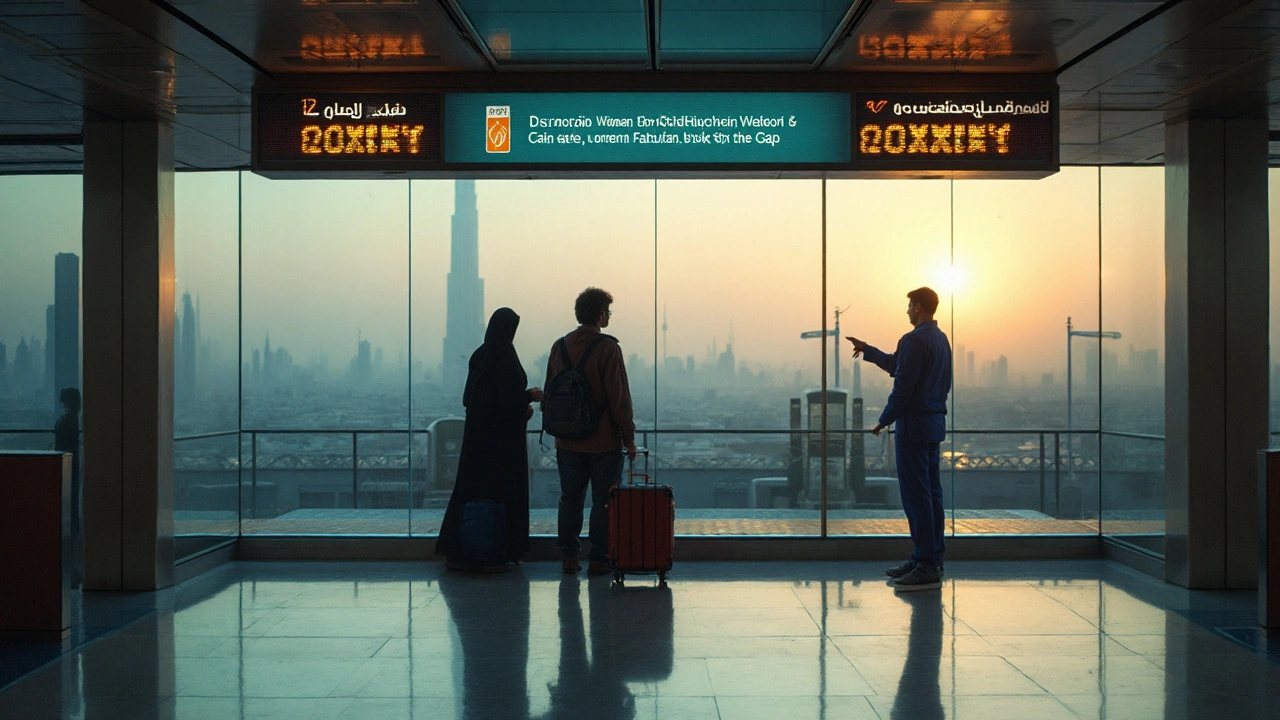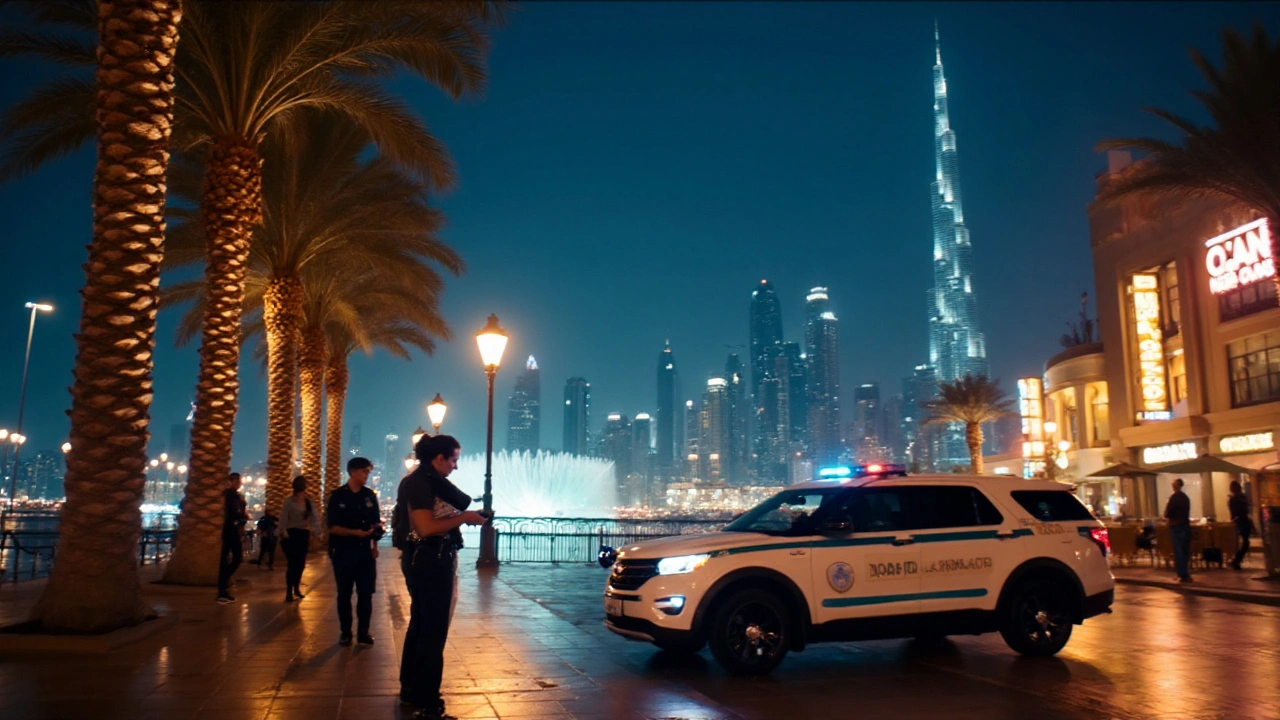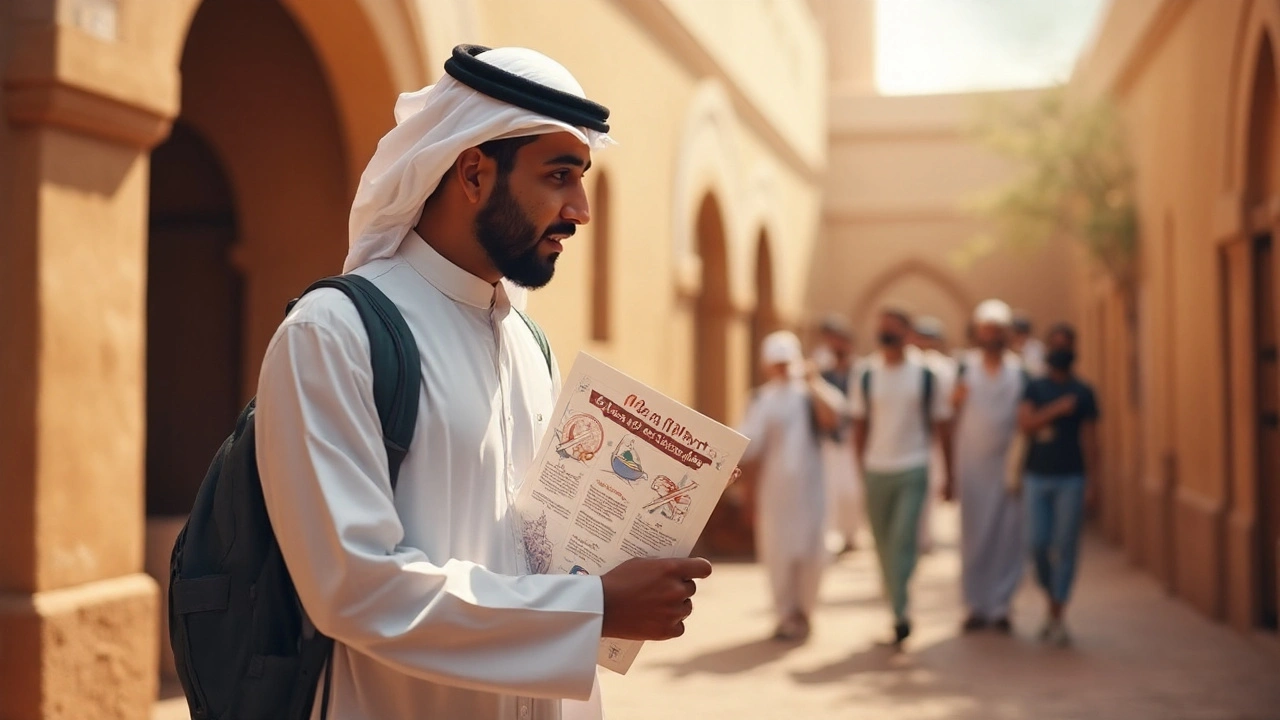
- Short answer: Yes-Dubai is safe for most Americans, with low violent crime and excellent infrastructure. The main risks are legal and cultural, not street crime.
- U.S. Dept. of State rates the UAE Level 2 (Exercise Increased Caution) in 2025, mainly for regional threats and strict laws-behave by the book.
- Key pitfalls: zero-tolerance drug policies (including CBD), public conduct rules, social media/cybercrime laws, and alcohol outside licensed venues.
- Women and families report high comfort; LGBTQ+ travelers should be discreet due to conservative laws and norms.
- Do the basics: registered taxis/Metro, modest dress in mosques, prescription documentation, travel insurance, and STEP registration.
What “safe” really means in Dubai for Americans
If you’re picturing a glittering city where you can walk around at midnight and feel fine-that’s Dubai most days. Violent crime is rare, police response is fast, and the city runs on cameras and rules. The trade-off? Those rules matter, and breaking them (even accidentally) can land you in trouble faster than you expect.
As of 2025, the U.S. Department of State lists the United Arab Emirates at Level 2: Exercise Increased Caution. That’s not a red flag; it’s a reminder to be careful, respect local laws, and stay aware of regional tensions that don’t usually touch tourists. Dubai Police tout strong crime prevention and quick clearance times, which lines up with what travelers report: pickpocketing happens in crowded souks or on packed Metro cars, but muggings are rare.
I travel solo often, and in Dubai I’ve felt safe walking in Marina, JBR, and Downtown long after dark. The vibe is cosmopolitan and orderly. Where people slip up is not crime-it’s laws: an unwise Instagram story, a heated exchange in traffic, the wrong supplement in your bag. If you keep that in mind, you’ll likely find Dubai one of the easiest big cities to navigate.
| Risk Category | Dubai for U.S. travelers | Notes |
|---|---|---|
| Violent crime | Low | Well-policed areas; cameras everywhere; incidents are uncommon in tourist zones. |
| Petty theft | Low to Moderate | Keep an eye on phones/wallets in souks, beaches, and the Metro at rush hour. |
| Legal exposure | Moderate | Strict drug, alcohol, conduct, and cybercrime laws; penalties can be severe. |
| Terrorism/regional tension | Low to Moderate | Advisories exist; everyday impact on tourists is limited but stay informed. |
| Road safety | Moderate | Good roads; high speeds and tailgating on some highways; many speed cameras. |
| Health/heat | Moderate | Extreme heat May-Oct; dehydration and sun exposure are real risks. |
Rule of thumb: Dubai is one of the safest big cities you’ll visit-if you follow the rules. The rest of this guide shows you exactly how.
The laws Americans stumble over (and how to avoid trouble)
The UAE has modernized its laws in recent years, but it’s still conservative in key areas. Most issues are preventable with a bit of prep.
- Drugs, CBD, and medications: Zero tolerance. Possession of illegal drugs-even residue-can lead to arrest. CBD oil/vape products are treated as cannabis derivatives and are illegal. For prescription meds (especially stimulants like Adderall, some painkillers, anxiety meds), carry the original container, a doctor’s letter, and keep amounts to personal-use quantities. Some controlled meds require prior approval via the UAE Ministry of Health (MOHAP) online portal; check before you fly.
- Alcohol: Drinking is legal for non-Muslims in licensed venues (hotels, restaurants, clubs). Tourists can purchase alcohol for personal use at licensed retailers with a passport. Public intoxication, drinking outside licensed venues, or drunk driving can lead to arrest.
- Public behavior: Public indecency and lewd conduct are illegal. Modest PDA (like holding hands) is generally fine; anything sexual or heated in public isn’t. Swearing, rude gestures, or aggressive arguments-especially on the road-can be treated as public offense.
- Social media and cybercrime laws: Defamation is a criminal matter. Don’t post photos of people (especially accidents, disputes, or officials) without consent. Avoid rant videos about a business or person. Sharing “fake news” or sensitive content can bring legal trouble. If you wouldn’t say it calmly to a police officer, don’t post it.
- Photography: You can photograph general public places and landmarks, but be cautious with people’s faces, license plates, private property, and government buildings. Always ask before photographing strangers.
- Ramadan etiquette: Restaurants serving non-Muslims operate normally; you can eat and drink in many public places, but be respectful. Dress modestly, avoid public displays of affection, and keep noise down during fasting hours.
- Dress codes: Beachwear belongs at beaches and pools. For malls, souks, and casual dining, think shoulders covered or a light layer; knees covered is appreciated in conservative areas. Mosques require full modest dress; women may be asked to borrow an abaya and cover hair; men should wear long trousers and sleeves.
- E-cigarettes and vaping: Vaping is regulated; follow designated smoking/vaping areas and don’t import products that contain prohibited substances.
- Drones: Recreational drone use requires authorization; flying without approval can mean confiscation and fines.
Sources you can trust for the latest rules: U.S. Department of State travel advisory for the UAE, UAE Public Prosecution and MOHAP updates, Dubai Police announcements. Check these right before you go; the rules are stable but enforcement is consistent.

Day-to-day safety: transport, neighborhoods, money, and avoiding friction
Dubai works best when you stick to official channels. The city rewards order.
- Transport basics: Use the RTA Metro, trams, and official taxis. Hala/Arabia Taxi booked through Careem are reliable; Uber cars tend to be higher-end and pricier. At the airport, ignore unsolicited drivers in the arrivals hall and follow signs to the official taxi ranks. Buckle up-fines exist for all seats.
- Driving: Roads are excellent, but speeds are high and tailgating happens. There are cameras everywhere; fines for speeding, red lights, and phone use are strict. Zero tolerance for drunk driving. If you rent, check that your U.S. license or International Driving Permit is accepted by your rental company, and ensure insurance covers the UAE.
- Neighborhoods: Tourist favorites like Downtown, Dubai Marina, JBR, Bluewaters, City Walk, and Palm Jumeirah feel safe at night. Deira and Bur Dubai are lively and fine to explore-just keep your wits about you in markets and busy streets.
- Money and payments: Cards are widely accepted. Keep a small amount of cash for smaller shops and tips. Use ATMs inside malls/hotels. Don’t exchange money on the street. Watch for dynamic currency conversion on card terminals-choose to pay in AED to avoid extra fees.
- Souks and shopping: Bargaining is normal at the Gold and Spice Souks. Stay polite, walk away if pressured, and compare prices at several stalls. For gold and jewelry, reputable shops weigh items in front of you and provide receipts with purity stamps.
- Excursions and activities: Desert safaris are safe with licensed operators. Wear seatbelts during dune bashing. ATVs and dune buggies: helmets on, no stunts. Water activities (jet skis, parasailing): use licensed beachfront operators and keep distance from swimmers.
- Beaches and heat: Hydrate constantly, especially May-October. Pack a rash guard or cover-up; sun is intense even in winter. Heed lifeguards and flags; jellyfish can appear seasonally. No alcohol on public beaches unless at a licensed beach club.
- Language and interactions: English is widely used. A calm, courteous tone goes a long way. If someone crosses a line, step away and involve security or police rather than escalating-verbal fights can be treated as offenses.
Heuristics I use: if it’s official, licensed, and boringly proper, it’s probably the safest option. If it feels off-books or like a shortcut, skip it.
Women, LGBTQ+, and families: what changes, what doesn’t
Women (solo or with friends): Many women love Dubai because catcalling is uncommon, lighting is excellent, and police take harassment seriously. Dress how you’d dress in a big U.S. city in summer, with a scarf or light layer for malls, older neighborhoods, and mosque visits. If someone bothers you, move to a staffed area and ask for security or police. Report harassment; there’s little tolerance for it.
LGBTQ+ travelers: The law and norms are conservative. There’s no legal recognition of same-sex relationships and public displays of affection can draw attention. Dating apps are used privately by some, but discretion is wise. Keep affection low-key, avoid political or activist messaging, and set app privacy settings carefully. Many LGBTQ+ travelers visit without incident by staying low-profile.
Families: Kids are adored in Dubai and family facilities are everywhere. Car seats are required by law for young children; taxis can be tricky for car seats-pre-book a service that provides one if you need it. Resorts, malls, and beach clubs are set up for strollers and family dining. Theme parks (IMG, Motiongate), aquariums, and desert experiences are popular and well run.
Couples and PDA: Holding hands is usually fine. Anything more intimate-save it for private spaces.
Religious items and attire: Wearing a cross or Star of David is fine. Worship is permitted for recognized groups in designated spaces. Respect mosque etiquette and use provided coverings where required.

Checklists, quick steps, and what to do if things go wrong
Use these to de-stress the planning and the trip itself.
Before you fly (10-minute safety prep):
- Check the latest U.S. Department of State advisory for the UAE and enroll in the Smart Traveler Enrollment Program (STEP).
- Review your medications. If any are controlled (stimulants, certain pain or anxiety meds), get a doctor’s letter and check MOHAP’s guidance on prior approval. Leave CBD at home.
- Photocopy your passport, visa-on-arrival eligibility, and insurance; store digital copies in a secure cloud.
- Buy travel insurance that covers medical care, trip disruption, and desert/water activities if you’ll do them.
- Download official apps: Dubai Metro/RTA, a reputable ride-hailing app, and your airline’s app. Consider the Dubai Police app for reporting.
- Pack modest layers for malls and mosque visits; swimwear for beach/pool only.
- Set your phone security and social media privacy; avoid posting about incidents or identifiable strangers.
At the airport and hotel (first-hour routine):
- Use official taxis only; keep luggage and valuables within sight.
- At check-in, ask the hotel concierge about licensed alcohol venues, nearby Metro stops, and the safest walking routes you’ll use at night.
- Stash passports in the safe; carry a photo ID (or a high-quality copy) day to day.
Daily conduct rules of thumb:
- Keep it courteous: no heated arguments, obscene gestures, or slurs-in traffic or anywhere.
- Photograph buildings and skyline, not strangers. Ask first if people are in frame.
- Drink only in licensed places. Say no to any unofficial offers.
- Hydrate like it’s your job; plan midday shade May-Oct.
If you’re stopped by authorities: Stay calm and respectful. Provide ID if asked. Don’t argue on the spot. If detained, request to contact your embassy or consulate and legal counsel. Avoid signing documents you don’t understand; ask for a translator.
If you lose your passport: Report it to local police via the nearest station or official app and contact your embassy or consulate for replacement and exit documentation. Your hotel can help guide the steps.
If you have a traffic incident: Don’t move the car unless instructed or it’s unsafe to leave it. Use official channels to report and wait for guidance. Exchange details calmly; avoid confrontations or filming others.
Mini-FAQ Americans ask me the most:
- Can I drink tap water? Treated tap water in Dubai is generally safe, though many visitors prefer bottled due to taste or building tank systems. When in doubt, choose bottled.
- Is it safe to wear shorts and tank tops? At beaches and resort areas, yes. In malls and older neighborhoods, bring a light cover-up. In mosques, follow strict modest dress.
- Is holding hands okay? Yes for couples. Avoid kissing or passionate PDA in public.
- Can I bring CBD oil or gummies? No. They’re treated as illegal drug products in the UAE. Leave them at home.
- Can I bring Adderall or similar stimulants? These are controlled. Carry a doctor’s letter, original packaging, and check MOHAP rules for pre-approval. If it’s not essential, consider alternatives while traveling.
- Can I post a video of someone being rude? Don’t. Filming and posting people without consent-especially in a negative light-can be a cybercrime/defamation issue.
- Do I need to cover my hair? Only when entering mosques or specific religious spaces. Otherwise, it’s optional.
- How do I find the safest taxis? Use official taxis from marked ranks or book through a well-known app. Avoid unlicensed drivers who approach you.
Red flags to walk away from:
- Anyone offering to sell or ship medications, vapes, or alcohol off the books.
- Street-side currency exchange or “gold deals” that seem too good to be true.
- Pressure to sign documents you don’t understand, in any setting.
Quick decision tree:
- Should I post this? If it shows a stranger, an official, or a negative incident-don’t post.
- Should I drink here? If it’s not a licensed venue-don’t drink.
- Should I bring this med/supplement? If you aren’t 100% sure it’s permitted-don’t pack it or get MOHAP confirmation first.
My take, after many trips and plenty of solo nights out: if you stick to licensed venues, use official transport, and keep your social media and conduct low-key, you’ll find Dubai easier and safer than most global cities.
Is Dubai safe for Americans? Yes-if you treat the law like a non-negotiable part of the itinerary.
Next steps by traveler type:
- Solo female traveler: Pick a hotel in Marina, JBR, Downtown, or City Walk; book rides via an app at night; pack a scarf for versatile cover.
- Business traveler: Confirm your company’s alcohol policy for client dinners; keep NDAs and devices tight-cybercrime and privacy rules are strict.
- Family with kids: Pre-book airport transfers with car seats; schedule outdoor fun early mornings or late afternoons; choose hotels with kids’ clubs.
- LGBTQ+ traveler: Choose international hotels, keep affection discreet, and set dating app privacy high. Focus on dining, beaches, malls, desert trips-low-risk fun.